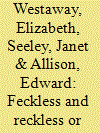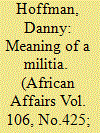|
|
|
Sort Order |
|
|
|
Items / Page
|
|
|
|
|
|
|
| Srl | Item |
| 1 |
ID:
080123


|
|
|
|
|
| Publication |
2007.
|
| Summary/Abstract |
Over the last decade evidence has emerged suggesting that in many countries fisherfolk, as an occupational group, are at greater risk to HIV and AIDS than the general adult population. This high vulnerability has been explained in terms of the lifestyles associated with fishing and related occupations, such as fish processing and trading. Fishermen have been portrayed as risk takers, their attitudes and behaviour shaped by the physical and economic risks of the fishing lifestyle. Women in fishing communities, often engaged in fish processing and trading and providing food and lodging in fishing settlements, are portrayed as being in subordinate social and economic positions and prey to sexual exploitation by cash-rich fishermen. There is a danger in such lifestyle summaries that fisherfolk are characterized as feckless risk takers with a reckless attitude to the chance of contracting HIV. In this article we look at the lives of some men, women, and children living in a lake-side community in Uganda severely affected by HIV and AIDS to illustrate how existing portrayals of fisherfolk, and fishing communities, need to avoid stereotypes in order to better inform appropriate health sector and livelihood support measures
|
|
|
|
|
|
|
|
|
|
|
|
|
|
|
|
| 2 |
ID:
080120


|
|
|
|
|
| Publication |
2007.
|
| Summary/Abstract |
Against the background of recent attempts to explain insurgency in the Niger Delta in the context of the "greed" of militant groups, this article argues that insurgency can best be explained by examining the social origins of militant groups. Focusing on the case of the Ijaw of Warri, from among whom the Movement for the Emancipation of the Niger Delta (MEND) emerged, the article seeks to demonstrate that insurgency is the consequence of longstanding experiences of political and social-cultural marginalization. Militant groups emerged as a result of the failure of the state and oil companies to respond to peaceful protests in previous decades
|
|
|
|
|
|
|
|
|
|
|
|
|
|
|
|
| 3 |
ID:
080122


|
|
|
|
|
| Publication |
2007.
|
| Summary/Abstract |
This article is an adapted, narrative version of an expert witness report the author wrote for the Defence of one of the accused before the Special Court for Sierra Leone. The case against the Civil Defence Forces militia was predicated in part on the argument that the CDF was a military organization with military-style command and control. Based on a close reading of the Prosecution's military expert witness report and the author's ethnographic research with the militia, the article outlines a case for understanding the CDF as the militarization of a social network rather than as a military organization. This framing has implications not only for post-conflict adjudication, but for how we think about and intervene in violent contexts throughout contemporary West Africa
|
|
|
|
|
|
|
|
|
|
|
|
|
|
|
|
| 4 |
ID:
080121


|
|
|
|
|
| Publication |
2007.
|
| Summary/Abstract |
Zambia's 2006 election was won by incumbent President Levy Mwanawasa and his Movement for Multi-Party Democracy (MMD). However, it is argued here that the most important outcome of the campaign was the successful articulation of a new populist politics by Michael Sata's Patriotic Front (PF), which won a significant majority in urban areas. Sata's attacks on foreign investors (particularly from China) for their abuse of the workforce and their supposedly corrupt relationship with the MMD resonated with urban Zambians, already angered by the negative impact of economic liberalization. PF's campaign injected popular social demands into what had become a moribund political debate. The MMD government is now adopting PF policies in an attempt to restore its own urban support base. The article describes the campaign and its outcomes, contrasting the political discourse of the MMD and PF and analysing the differences in voting behaviour between rural and urban Zambians. It argues that recent relief of 92 percent of Zambia's international debt, along with the renewed profitability of the copper mining industry, have created conditions for the re-emergence of a nationalist-developmental political framework.
|
|
|
|
|
|
|
|
|
|
|
|
|
|
|
|
| 5 |
ID:
080119


|
|
|
|
|
| Publication |
2007.
|
| Summary/Abstract |
The debate over land law reform in Africa has been framed as a referendum on the market - that is, as a debate pitting advocates of the growth-promoting individualization of property rights against those who call for protecting the livelihoods and subsistence rights of small farmers. This article argues that the prospect of land law reform also raises a complex bundle of constitutional issues. In many African countries, debates over land law reform are turning into referenda on the nature of citizenship, political authority, and the future of the liberal nation state itself. The article describes alternative land reform scenarios that are currently under debate, and identifies the constitutional implications of each. The practical salience of the issues is illustrated through reference to land reform politics in Côte d'Ivoire, Uganda, South Africa, and Tanzania
|
|
|
|
|
|
|
|
|
|
|
|
|
|
|
|
|
|
|
|
|